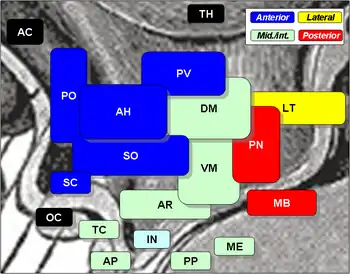Posterior nucleus of hypothalamus
The posterior nucleus of the hypothalamus is one of the many nuclei that make up the hypothalamic region of the brain.
| Posterior hypothalamic nucleus | |
|---|---|
 Posterior nucleus is 'PN', at right, in red. | |
| Details | |
| Part of | Hypothalamus |
| Identifiers | |
| Latin | nucleus posterior hypothalami |
| NeuroNames | 420 |
| NeuroLex ID | birnlex_1463 |
| TA98 | A14.1.08.939 |
| TA2 | 5738 |
| FMA | 62350 |
| Anatomical terms of neuroanatomy | |
Its functions include elevation of blood pressure, pupillary dilation, and shivering or body heat conservation (thermoregulation).[1] Damage or destruction of this nucleus causes hypothermia. Descending efferents from the nucleus synapse on the sympathetic neurons of the spinal cord, which exist in the thoracic and lumbar regions in the lateral horns.
References
- Fundamental neuroscience for basic and clinical applications. Haines, Duane E., Ard, M. D. (March D.) (4th ed.). Philadelphia, PA: Elsevier/Saunders. 2013. ISBN 9781437702941. OCLC 794603152.
{{cite book}}: CS1 maint: others (link)
This article is issued from Wikipedia. The text is licensed under Creative Commons - Attribution - Sharealike. Additional terms may apply for the media files.